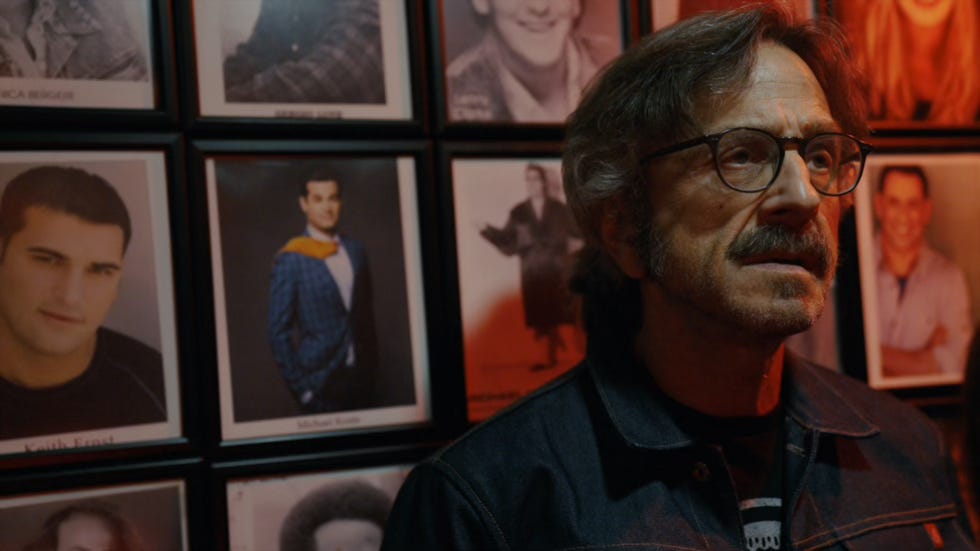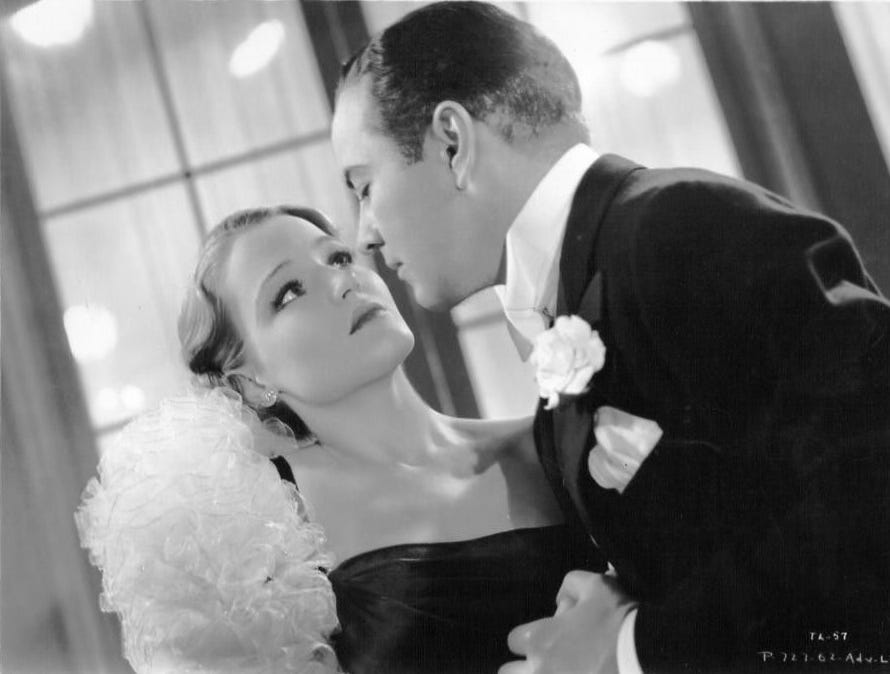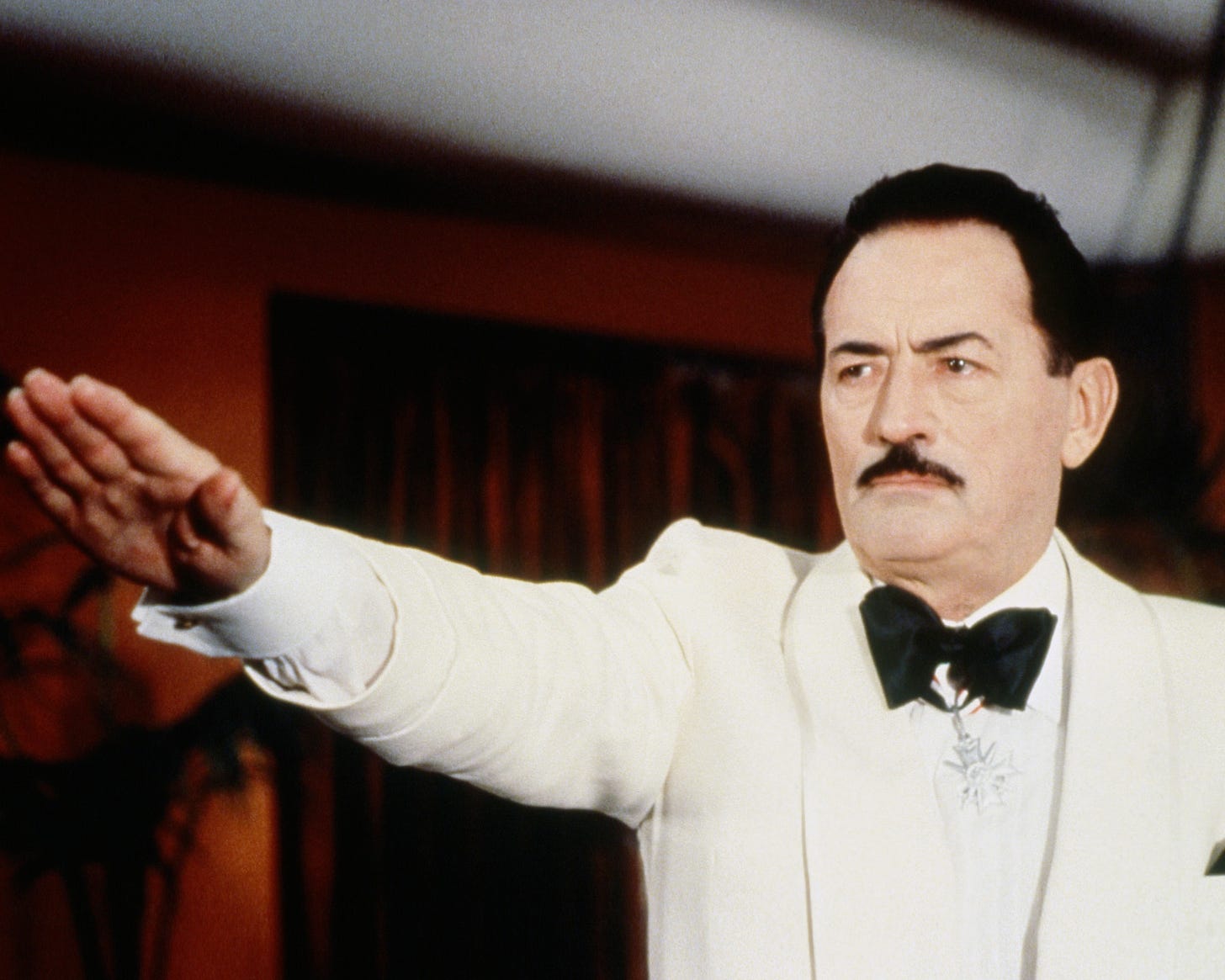This post is free but it’s worth it to become a paid member of The Film Maven community! Paid subscribers are the backbone of The Film Maven and becoming one shows support for independent journalism, as well as female- and disabled-created content. It also allows me to write really fun articles and hire freelance writers. And becoming a paid subscriber gives you access to The Trade, my examination and exploration of topics in the entertainment industry, my Popcorn Disability articles on disabled representation in film, and more. I also cross post these over at The Film Maven Patreon where you can subscribe, at the same price, without supporting Substack itself. Subscribe and show your support for independent journalism.
Summer is just breezing by me (and it’s not at all reminding me that I’m on deadline for another book). What I watched and read in June was a heady mix of classic and contemporary, weird to formulaic, and because I overshare I’m gonna continue mixing in the best stuff I watched with everything else that didn’t make the cut. So let’s dive! Let me know what you enjoyed watching and reading in June, and what you’re looking forward to in July. Scroll further down and you'll see my “Expiring on Criterion Channel” monthly list I’ve been sharing in the group chat. Tell me what to prioritize!
Clicking the title links will take you either to my original review/coverage or a link to purchase it!
The Best
Prime Minister (2025)
Documentarians Michelle Walshe and Lindsay Utz made a story that, dammit, I needed right now. Prime Minister isn’t just the story of New Zealand’s female prime minister Jacinda Arden. It’s also a look into empathetic leadership and balancing the needs of a country’s people against the needs of the world. I try not to get too political on here—harder and harder these days—but after the last month it was so refreshing and bittersweet to watch a competent leader like Arden try to help her country during the rise of COVID. Even Walshe and Utz were surprised at how timely the movie was, telling me in an interview that, “We could never have imagined that it was going to land in this moment like this week,” said Walshe. “I'm just still baffled, what we're watching from afar. You guys are watching it up close.”
The Taking of Pelham One, Two, Three (1974)
Up until last month my experience with The Taking of Pelham One, Two, Three was the 2009 remake with Denzel Washington and John Travolta, a movie I remember liking but have had no interest in revisiting since. Thankfully, everyone recommended I watch it when I posted my June “Expiring on Criterion Channel” list and thank you all because it is amazing!
Four armed hijackers take a New York City subway car and from there you get an hour and 45 minutes of pure character development and action. And not necessarily action in terms of shootouts and fast moving cars, but high stakes and tension. Robert Shaw as the main hijacker Mr. Blue, and Walter Matthau as the put-upon subway detective Lt. Garber have an intense relationship purely through microphone. Without belaboring each other’s background, the script lets us know exactly who these men are, enhanced by Matthau and Shaw’s demeanors. You don’t need in-depth backstories on these two men, but you desperately want them. Alongside these two and their cat-and-mouse game you get Hector Elizonda…as a villain…with hair! And all the hostages on the train get a moment to shine. When they say “they don’t make movies like they used to,” I’d like to think they’re talking about Taking of Pelham One, Two, Three.
28 Years Later (2025)
From my review: Was it worth the wait? It’s odd. And that’s not a bad thing. 28 Years Later plays on a lot of various themes amongst Boyle’s filmography from the sentimentality found in his feature Millions to the slick visuals and languid storytelling of The Beach. Garland’s script is completely unpredictable, and I’m not exaggerating that at all. But it is hard to believe there’s a structured sense of why things are happening in the movie. It’s impossible to imagine all these plot beats being thought in advance. 28 Years Later is a recipe I’d assume says: a dash zombie movie, a pinch of melancholy story of loss and existence, a hint of tone poem, and a soupçon of batshit insane.
28 Years Later is still an entertaining ride, but it coasts on the goodwill of the franchise and a cultural love for zombies. That and vibes. Williams, Comer and Fiennes are stand-out. Boyle still knows how to tell a story well!
Don’t Let’s Go to the Dogs Tonight (2024)
Based on Alexandra Fuller’s memoir of the same name, Embeth Davidtz’s directorial debut follows 8-year-old Bobo (Lexi Venter) as she witnesses the last days of the Rhodesian Bush War. She watches her mother, Nicola (Davidtz), struggle to give up land she believes is rightfully hers, while the Black house servants and locals Bobo interacts with desperately want change. I have a full interview with Davidtz dropping this week and she has such a flair for adapting written material. The film examines the colonialism of the time period with an acute awareness of the racism and power imbalances at play. Alongside that, Venter is a bright young discovery—not surprising considering Davidtz’s work with child stars in Matilda. This was one where I kept thinking about the acting choices, the bits of business, certain performers did, as well as the grander impact of a story like this coming out now. If this is in your city, go see it!
Dark Carnival: The Secret World of Tod Browning
This is going up there with Character Limit for one of the best books I’ve read this year. Out of print for several years, Dark Carnival was recently republished in a beautiful updated edition and I finally have a copy I can put on my shelf. Tod Browning is one of the most shadowy, fascinating, and (potentially?) progressive directors of the silent era into the 1930s. While he’s best known as the director of 1931’s Dracula, it was the release of 1932’s Freaks that made him infamous, and kinda sorta ruined his career. Authors David J. Skal and Elias Savada pull from first-person interviews and other primary source material to lift the veil on a man who was deeply fascinated by disability. Add in some breathtaking photos from the era and Dark Carnival isn’t just the foremost biography on Browning, but it’s also essential reading for anyone interested in disabled film history in the 1930s.
Are We Good (2025)
I’m not a Marc Maron fan. I know nothing about him and I’ve never listened to his comedy. But I think that might have changed after watching Steven Feinartz’s documentary on Maron, Are We Good? What could have been a typical documentary about a stand-up comic returning to the stage in the wake of tragedy is actually a quiet and sensitive look at grief, and wondering how one finds their ability to laugh at anything, let alone make up jokes, in the face of great loss. “When he came back on his next podcast, and even through the Instagram lives that he continued doing, it was just the most heart wrenching [thing]. But, personally, revelatory,” said producer Julie Seabaugh to TFM, and she’s right on the money. This is a documentary that is, at different points, heart wrenching, funny, and revelatory. Whether it’s Maron tearing up while looking at his late partner Lynn Shelton’s raincoat or being ecstatic to get a picture of her from a fan every scene is so imbued with meaning. It’s a truly beautiful doc.
Last Take: Rust and the Story of Halyna (2025)
I’m starting to realize how many sad movies I’ve watched this month and that tracks. Was June a good month for anyone? But in all seriousness, director Rachel Mason’s Last Take is a thought-provoking and uncompromising exploration of the death of cinematographer Halyna Hutchins. As Mason explained, what started as an attempt to document Halyna’s life turned into a story of trying to understand how and why she died. If you thought you knew everything about this case, you’ll find something you didn’t know here. The level of access, to both on-set footage and people at the scene, is astounding, many of whom are frank about their own complicity in what happened. It’s a shame this movie isn’t being more widely brought up considering how the Rust cast dominated everyone’s timeline but, as Mason lays out, that’s the point. The case was never about the death of Hutchins, thought it should have been, and she lays out a compelling case to turn the narrative.
Stolen Time (2023)
Speaking documentaries we should be talking more about. I was fortunate to watch Helene Klodawsky’s documentary Stolen Time, exploring the issues inherent in the Canadian nursing home industry. (I picked a great time to watch this after the OBBB passage.) Though this is speaking to Canadian politics there are heavy implications for how things are being handled in nursing homes today—Reid Davenport’s Life After would make a good, though infuriating, double feature. From outright negligence to just low quality of life, how countries choose to treat their elderly and disabled remains a travesty and this puts a pretty big lens on it.
My Mom Jayne (2025)
There’s a lot to be said about My Mom Jayne, both positive and negative. I get leery when I see a documentary or biography about an Old Hollywood star where the family is involved as it can sometimes lead to an overly sanitized or hagiographic depiction of the person. While directed by Jayne Mansfield’s daughter, actress Mariska Hargitay, the fact that Hargitay has no concrete memories of her mother puts her in the liminal threshold between family and outside observer which allows for a more warts and all depiction. As my friend, and Mansfield expert, April Verve says, the “My” in the title is significant as the first half if front loaded to Jayne and the second focused on Hargitay herself and the revelation that actor Mickey Hargitay was not her biological father. The documentary is never boring and is incredibly emotionally resonant but your mileage will vary based on what you hope to get out of it. (If you’re a Patron of my classic film podcast, Ticklish Business, you can listen to a more in-depth interview with Vevea and I about the documentary over there soon.)
The Rest
Delightfully Dangerous (1945)
Should I have had high hopes for this one? Nope. It’s a Jane Powell movie and what you see is what you get. Not to say there aren’t great Jane Powell movies (I love A Date With Judy and Royal Wedding), but the majority have a lot of the same format and humor to them. Delightfully Dangerous sees Powell as a teenage girl desperate to make it on Broadway. She believes her older sister has succeeded but is horrified to find out she’s a bubble dancer. There’s a lot that could be written about the weird push-pull of sexualizing Powell and/or utilizing her innocence in a sexual way and Delightfully Dangerous tries its damndest. By the third act Powell is tarted up and trying to entice Ralph Bellamy of all people. It’s silly at best and outright boring at worst. (Powell movies work best in Technicolor.)
Materialists (2025)
From my review: Materialists is as shallow as its characters, but so desperately wants to think it isn’t. The script is all over the place, and when it finally settles into a groove there still seems to be pieces missing. Johnson falls flat while Evans tries his utmost to charm. The MVP is Pedro Pascal, though he’s underutilized and set up as a second banana in the Ralph Bellamy mode for reasons that just seem mean. This ain’t gonna make anyone’s rainy day (last Madonna reference).
This Man is Mine (1934)
Another Ralph Bellamy movie and this one is even funnier in that two women are actively vying for his affections. (If you aren’t an Old Hollywood person, Bellamy was often the second or third banana without a shot in Hell of getting the girl at the end.) This John Cromwell-directed feature is actually decent in that Irene Dunne plays Bellamy’s wife, a woman who believes her marriage is a happy one. And it is, until Bellamy’s ex-girlfriend (played by the delightful Constance Cummings) arrives. From there the movie is a fairly realistic look at how a woman deals with her husband’s infidelity. The ending is remarkable by 1934 standards in that Dunne’s Tony isn’t particularly interested in taking her wayward husband back. Sure, the audience knows it will happen, but the script doesn’t seem to want it to. It’s worth checking out if it’s on TCM as it’s sadly not on physical media.
Elio (2025)
From my review: There’s several threads tied together in Elio that, on their own are interesting, but feel shortchanged when tied into the knot that is the actual movie. Elio is a shy, lonely little boy whose parents died in some unknown incident—bad enough that he’s referred as “the boy whose parents died”—and lives with his Aunt Olga. Right away there’s a familiarity on par with a reverse Lilo & Stitch, but there’s the bare minimum of insight into Elio and Olga’s relationship. We know she spends her days monitoring the skies for space debris and has eschewed joining the military’s space program to care for her nephew. But there’s only about 20 minutes to establish her absenteeism and his problematic nature. Elio laying on the beach with a makeshift sign—”Aliens, abduct me, please”—is hilarious and leads to a great fight scene that shows off his inability to make friends.
Elio is a charming little delight, but it never rises beyond this. This isn’t a soon-to-be Disney/Pixar classic and holds more in common with smaller films like Luca or Soul. The story is interesting, but the script adds in too many subplots to make anything feel central. This is a story made in pieces and while some pieces are fascinating and fun to watch, it’s frustrating that the whole doesn’t work as well.
M3GAN 2.0 (2025)
From my review: Where the first M3GAN drew inspiration from Child’s Play (and potentially Disney’s Life Size), M3GAN 2.0decides to go for straight up ‘80s action movie, and all that that implies. While it aims to hearken back to the likes of Terminator 2 it comes off like a haphazard logjam of various robot movies with little that makes it feel, decidedly, M3GAN…M3GAN 2.0 works when M3GAN is front and center but, as it stands now, there’s just not enough of her. Jenna Davis and Allison Williams continue to work well off each other, but their central conflict is smothered by a haphazard ‘80s techno plot that’s too muddled to be interesting. At least we can all still do the M3GAN dance.
JFK Jr.: An Intimate Oral Biography
Weirdly enough, I started reading this before the whole Ryan Murphy series snafu started. The death of JFK Jr. and his wife and sister-in-law is one of my earliest celebrity death memories (next to Phil Hartman). Since the time, I’ve been intrigued by the deification of him and this oral history attempts to tell us about the man, not the image. Though author Rosemarie Terenzio is a friend of the late JFK Jr., she makes an effort to show us who Kennedy was like and it’s not all great. There are plenty of moments where he comes off as apathetic and selfish as he is brilliant and funny. But there remains a hollowness to everything. Maybe it’s the lack of any of Kennedy’s own interviews, or those of his family. Either way, this was a good read but I still came away from it knowing only a little more about him than I anticipated. But, maybe that’s the point? We can never truly know a figure unless we were there. Either way, it makes for intermittently frustrated reading.
The Boys From Brazil (1978)
This was one I’ve been meaning to see for awhile and it happened to be on my monthly “Expiring on Criterion.” Based on Ira Levin’s novel of the same name, the movie follows a Nazi hunter (Laurence Olivier) trying to stop Dr. Joseph Mengele (Gregory Peck) who is engaged in a bizarre plan that’s been ongoing for years. On the one hand, it’s great to see how some of the older A-list Hollywood actors of the studio era were getting along into the 1970s. Olivier and Peck are fantastic, particularly the latter playing the evilest of men. (Hearing Peck curse was enough to induce a gasp out of me.) But you have to remember this is an Ira Levin novel, so the third act takes a harsh left turn into laughably bad. The eventual plan Mengele is enacting is ridiculous as all get-out and the teen boy in the role is laughably bad. It does undo a lot of the tension set up and becomes a cheap Omen remake. But Gregory Peck calling someone a “bitch” is still worth a watch.
F1 (2025)
From my review: Considering Kosinski and screenwriter Ehren Krueger’s last team-up, 2022’s Top Gun: Maverick, it’s not surprising this feels like Tom Cruise should be in the title role. Sonny Hayes is a guy who comes out of his tuna can/home to Led Zeppelin’s “Whole Lotta Love” and is the guy you allow to “let do his thing.” He’s a rebel, he’s a loose cannon, he’s a…maverick, you might say. We meet Sonny as he’s competing in the Daytona 500 and it’s this scene that is the film’s highpoint. Claudio Miranda’s fantastic cinematography—best rendered on an IMAX screen, if you have the opportunity—lushly showcases the artistry of the drive. As fireworks pop off in the frame it’s an exquisite moment that the movie chases throughout the rest of its runtime. It’s not that the other drive scenes aren’t equally stunning, but it’s this moment where everything just makes you gasp in awe.
Everything and everyone is in service to Sonny, who becomes a bit of a race car Messiah by the time F1 is over. It’s not that F1 is a bad movie, just a painfully silly one, and that can work if it’s what you’re seeking. On its own it’s a stock race car movie whose magnetic visuals do a lot to help an uninspired story. Idris is great but everyone swirls around Pitt, who isn’t given anything beyond a typical Brad Pitt performance. If Tom Cruise was in this movie, what might have been, and it’s hard not to keep thinking that while watching.
Jurassic World: Rebirth (2025)
From my review: A text crawl lays out at the beginning of Jurassic World: Rebirth that it’s been 32 years since dinosaurs returned, and that in those 32 years not only has our climate and viruses killed most of them off but “interest has waned.” Nobody cares about dinosaurs anymore in this world and that certainly feels true of Rebirth, which spends more time focused on its numerous characters rather than how dinosaurs are living in 2025. The end result is a movie that feels more primed to spin-off a Land of the Lost retread than anything passing for Jurassic Park.
Jurassic World: Rebirth still can’t find an interesting story worth telling with its premise. Content to ride the coattails of the original, Rebirth tries two competing stories, neither of which amounts to much. The cast is fun, at least, and keep the entire film from floundering but it’s hard to think we’ll ever see them again. The world has grown weary of the dinosaurs here, and it seems like screenwriters are too.
The Panic in Needle Park (1971)
After finishing Al Pacino’s autobiography Sonny Boy I knew I wanted to see some of the earlier work of his I’d bypassed. One of them being this Jerry Schatzberg directed feature from 1971. Pacino and Kitty Winn play two heroin addicts in love who live in New York City’s “Needle Park,” aka Sherman Square. You can see the connections to other drug-centric movies that would pop up in the film’s wake, but I was captivated less by Pacino and more by Winn, who plays the lovelorn Helen. For all of Pacino’s Pacino-ness, Winn sits there in quiet contemplation. You see the eagerness, the love, the frustration, the shame. This isn’t a movie I particularly had fun watching, but it reminded me of why so many 1970s films are such a punch in the stomach.
Please Believe Me (1950)
If there’s one movie I outright hated watching it’s this Norman Taurog-directed feature. Deborah Kerr plays a British woman who discovers an elderly American penpal she’s been corresponding with has died and left her an inheritance. Though the audience sees the inheritance is probably garbage she immediately gets on a ship to America. Along the way she meets three different men: one a fortune hunter (Robert Walker), another a wealthy playboy (Peter Lawford), and the playboy’s dependable attorney (Mark Stevens). Which one will Kerr’s Allison choose? Though they clearly set up one guy as the winner the ending will leave you scratching your head as the pair have zero chemistry. Kerr has chemistry with none of the men but the guy they choose as her paramour feels like someone just pulled a name from a hat. It’s unfunny and boring, to boot. But Peter Lawford is pretty at least.
Dangerous Rhythms: Jazz and the Underworld
T.J. English is one of favorite writers. Go read Havana Nocturne and The Savage City right now. His latest plays one a lot of the themes he’s written on prior, particularly the Mob and Havana. Having read Havana Nocturne there was a lot that felt repetitious here. The focus becomes less and less on jazz, and the co-opting of Black music, and more a standard Mob story. It isn’t one of English’s best works but he continues to have such a skill for cementing time and place in his books.
The Guilty (1947)
This one was a doozy, and while the movie is formulaic it is the ending that makes it worth watching. Bonita Granville plays a dual role as sisters going back-and-forth dating two different men. When the good sister is killed it’s up to the bad one, and one of the men she’s dated, to solve the case. The movie can’t be as salacious as it should—it’s 1947 after all—but the final sequence is interesting. There are also some kooky plot points that I was surprised were touched on at all.
And here’s my “Expiring on Criterion” list for July.
Have you considered subscribing to The Film Maven’s Founders Plan? As a Founder you can set up regular Zoom meetings with me to learn how to get into film journalism or publishing. Founders also receive regular care packages and swag! Consider becoming the ultimate Film Maven Founder today.
What movies did you enjoy in June? What should I prioritize in July? Leave a comment below or join us in The Film Maven Chat to discuss this and other topics!
















I like that you threw some Thirties and Forties into the mix.